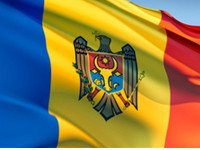Moldova next on the line after Syria?
Communists of Moldova announced the possibility of a "velvet revolution" in the country. This fall Moldova is to sign an association agreement with the European Union and further distance itself from Russia. In this situation, a "peaceful" revolution seems quite real. Could that be that someone wants to destabilize the situation through raising the Transdniestrian issue once again?
This was stated by Vladimir Voronin, the Party of Communists of the Republic of Moldova (PCRM)) chair. The third President of Moldova said that this fall the Communists and the public were going to achieve dissolution of Leancă's government, and all their protest potential, the most valuable experience of street fighting, needs to be directed at solving a single task - to force the parliament to dismiss the government. "We're talking about it openly, without any conspiracy."

"We're not going to hide our private civic feelings. We cannot sit back and watch how today's power leads Moldova into political elimination and economic bankruptcy. On the contrary, we have to sound an alarm and organize a national resistance to the treason. Every regional party organization has been tasked with preparation of activists who will be able to participate in the acts of disobedience, will not succumb to provocations and will calmly take advantage of their right to an ultimatum to the people's regime," said Vladimir Voronin.
He also stressed that it was time for sober calculation, comprehensive and meticulous preparation for the resignation of the government. "We are not going to threaten the regime with a "velvet revolution." We are starting to implement it." "This fall is our time. The Moldovan people will finally reap the main political harvest. The government needs to go. Democratic elections will decide the fate of our long-suffering motherland," he concluded. The Communist Party leader believes the resignation of the newly formed government headed by Yuri Leancă and new parliamentary elections to be his main goals. Voronin accused the current cabinet of making the decisions "dictated by the West." He also called the fact that the authorities want to recognize the independence of the breakaway republic of Transnistria treason.
On May 30, 2013 Moldova managed to reformat its legislative and executive power. A new coalition was formed in the parliament, a new Speaker was elected and the composition of the new government was approved. Leancă became Prime Minister. The new government included a vast majority of ministers from the former, "European integration" composition.
Leancă is a graduate of the Moscow Institute of International Relations. He started his career at the Foreign Ministry in Moldova, working as a counselor to the embassy in the United States and a deputy minister. In the 2000s, he worked as an advisor to the Commissioner on National Minorities. He managed a number of foreign NGOs. He believes his main task to be signing an agreement on Moldova's accession to the European Union, liberalization of the visa regime, as well as the creation of a free trade zone. The new government is composed of people who fiercely hate each other. It was formed under pressure from the European Union officials.
The European Commissioner for Enlargement Stefan Fule visited Moldova for this very reason. In November of this year at the Vilnius summit Moldova is to sign an association agreement with the EU. The current ruling coalition that came to power after 2009 wants to get closer to the West and break away from Russia. The West is helping them in any way possible. The signs of a sharp cooling in the relations with Russia are already very apparent. Criminal cases against the leader of the party "Patriots of Moldova" Mikhail Garbuz and Russian Youth League leader Igor Tulyantsev were initiated. A pro-Western dictatorship regime was established in Moldova. The new coalition includes russophobes Ana Gutu and Ion Hadarca. Vitaly Marinuta, an ardent supporter of the republic's entry into NATO, was appointed the Defense Minister.
The Moldovan Communists have been threatening with a "velvet revolution" and change of the "regime" for several years. But, despite the weakness of the current government, they still have not been able to hold early elections in the country and regain power. Now a lot has changed. Every month the rating of the Communists is growing, and it is trusted by increasingly more ordinary citizens. The Communists led by Vladimir Voronin were in power for eight years (2001-2009).
In 2009, the Communists were succeeded by the Liberal-Democratic Alliance currently in power. According to the results of the survey of "The Public Opinion Barometer," the Moldovans want to re-elect a Communist president, Vladimir Voronin. 28 percent of respondents were in favor of electing Voronin for his third presidential term. The Incumbent President Timofti received only 1 percent of votes. The chairman of the Democratic Party Marian Lupu is in the second place (6 percent), and the Liberal leader Mihai Ghimpu is in the third place (5 percent).
Liberal Democrat Vladimir Filat took fourth place (3 percent). Moldovans trust the Communist Party. At the early parliamentary elections PCRM could obtain 39 percent of votes, Liberal Democratic Party - 12.6 percent, PDM - 8.6 percent, PL - 7.5 percent. 77 percent of respondents believe that Moldova is moving in the wrong direction, and only 15 percent of the respondents are satisfied with the situation. The main problems of Moldova, according to respondents, are poverty, unemployment, corruption, and low pensions and salaries. These numbers suggest that the Communists have a good chance to regain the leadership positions in the country. With such support among the population, they can arrange some kind of revolution.
The country is currently run by the pro-Western coalition. The U.S. State Department never does anything without reason. According to some experts, Moldova is now playing out a multi-step combination with the primary goal of drawing Russia into a new global war. 20 years ago, generation of ethnic strife and civil war was launched, and only the presence of Russia's 14th Army in Transnistria made it possible to localize the war. Another attempt to ignite a new war was made in 2009.
Perhaps not everyone knows that the rally of the "innocent" youth on April 7 in downtown Chisinau was meant to initiate chaos. The next step was to introduce groups of Albanian extremists who proved themselves in ethnic massacres in Kosovo and Serbian pogroms from Romania. This group, numbering three thousand people, was waiting at athe border with Moldova for an order to attack. However, the order was not given, and things did not go as planned.
Moldovan special services found out about the planned activity. This did not allow the State Department to launch the process of Moldova elimination and unleashing a large-scale operation against Russia in Central Europe. If the U.S. is able to incite the European countries in a war against Russia, it would simultaneously get rid of its two major global rivals - Russia and the European Union.
The failure of the Georgian military operation and prolonged Syrian campaign brings the issue of the beginning of a military operation in the Republic of Moldova to the forefront, as there are no other places in close proximity to Russia where they could provoke such events. The approaches in other areas are blocked. Moldova has a long dormant center of tension that the State Department may skillfully reactivate. This may happen as early as this fall, when people come out to protest. This will create certain provocations that could lead to bloodshed. This would be blamed on Russia, and a large-scale military campaign would commence. Therefore, the Moldovan Communists and the Russian government should do everything they can to ensure that a possible "velvet revolution" does not lead to a new Transnistrian conflict that the "partners" from across the ocean are so eager to unleash.
Servei Vasilenkov
Pravda.Ru
Subscribe to Pravda.Ru Telegram channel, Facebook, RSS!


